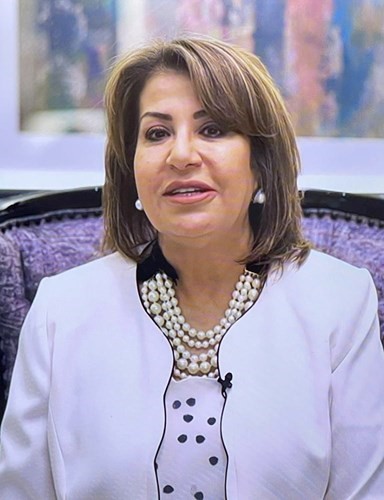Kuwait leaps ahead with AI integration into education
Academics praised Dr. Adel Al-Adwani’s decision to establish a committee aimed at integrating artificial intelligence technology into the computer curriculum, noting its alignment with modern technological advancements.

-
AI bridges knowledge and information, aiding individuals seeking knowledge with suitable methods anytime, anywhere, showcasing its impactful role in problem-solving and assistance. said Dr. Muhammad Al-Otaibi, President of the Kuwait Society for Postgraduate Studies
-
“There is no doubt that Dr. Adel Al-Adwani’s decision to integrate AI into the computer curriculum is a successful step in the right direction, aligning with Kuwait’s vision to become an artificial intelligence hub,” said Professor Walid Khaled Al-Enezi, a Curriculum and Teaching Methods expert at Kuwait University’s College of Education
-
Artificial intelligence is driving a transformation across various educational aspects, such as teaching, assessment, guidance, and curriculum development, said Dr. Saud Nasser Al-Tami, a professor of law
-
AI is a vital technology integrated into modern life, offering immense benefits. Its inclusion in education is crucial, reflecting the government’s commitment to tech-savvy youth, said Dr. Siham Al-Qabandi, Professor of Social Planning at Kuwait University
A number of academics have praised the decision of Dr. Adel Al-Adwani, Minister of Education and Minister of Higher Education, to establish a committee aimed at integrating artificial intelligence (AI) technology into the computer curriculum.
The committee, led by Dr. Abdullah Al-Mutawa from Kuwait University’s College of Engineering and Petroleum, includes the Assistant Undersecretary for Public Education, the Assistant Undersecretary for Educational Research and Curriculum Sector, and the general supervisor of computer education. They noted that this decision aligns with modern technological advancements.

At the outset, Dr. Muhammad Al-Otaibi, President of the Kuwait Society for Postgraduate Studies, emphasized the significance of AI. He underscored the importance of integrating it into education, noting that it’s a sophisticated system that empowers the educational system with substantial capabilities to evolve, achieve objectives, and cater to all individuals seeking knowledge by providing necessary information and knowledge.
Al-Otaibi elaborated in an exclusive statement to Al-Anbaa newspaper that AI serves as a bridge between knowledge, stored information, and individuals seeking knowledge. It offers them suitable methods anytime, anywhere, highlighting AI’s robust and impactful role in providing assistance, solving problems and challenges, strengthening strengths, addressing weaknesses, and offering real-time translation of linguistic texts in a simpler and more accurate manner.
Al-Otaibi stated that employing AI remotely contributes to enhancing the quality of education and fostering a culture of learning in diverse and effective ways that align better with the modern era. Additionally, AI will help in minimizing cheating and offering personalized educational opportunities tailored to each student’s needs, eliminating barriers and challenges while providing solutions for students with different skill sets.
Al-Otaibi praised Al-Adwani’s decision to integrate artificial intelligence into the computer curriculum, emphasizing the importance of this step in aligning with the significant advancements in technology.

Technological revolution
Professor Walid Khaled Al-Enezi, a Curriculum and Teaching Methods expert at Kuwait University’s College of Education, remarked to Al-Anbaa, “There is no doubt that Dr. Adel Al-Adwani’s decision to integrate AI into the computer curriculum is a successful step in the right direction, aligning with Kuwait’s vision to become an artificial intelligence hub.”
Al-Enezi elaborated, stating, “This move is part of the global digital transformation in education, emphasizing that AI represents the pinnacle of scientific achievement, technological revolution, and industrial progress. Therefore, adequately preparing for this shift is crucial to keeping abreast of scientific advancements, creating a conducive educational environment, training educators, and ensuring our students are ready for a seamless transition in knowledge acquisition, which is pivotal for their academic development.”
Al-Enezi also discussed the significance of artificial intelligence in education:
- It contributes to alleviating the administrative and routine burdens of teachers or school administration.
- It aids in distinguishing individual differences between students and their learning styles, addressing challenges like teacher shortages and high student density in classrooms, as evidenced by the attention given to students in China.
- The current challenge in education lies not in acquiring knowledge or information but in effectively utilizing and applying it by presenting students with challenges, problems, and opportunities to make decisions.
- Knowledge and Investment Fund in Artificial Intelligence: Attracting Minds for the Future.
Al-Enezi pointed to the following challenges of AI:
- Internet infrastructure.
- Awareness, safe use, and psychological treatment.
- Partnership with the private sector.

Quantum leap
Dr. Saud Nasser Al-Tami, a professor of law and a lawyer before the Court of Cassation and the Constitutional Court, expressed in a special statement to Al-Anbaa that the decision to integrate AI into the computer curriculum is a qualitative step by the Minister of Education and Higher Education, Dr. Adel Al-Adwani.
He emphasized that this decision keeps pace with global trends of using technology extensively in education. Furthermore, he stressed the importance of providing an educational environment capable of effectively absorbing and managing this development to avoid repeating the failure experienced with the tablet project.
Al-Tami emphasized that adopting AI isn’t merely a decision; it necessitates preparing an educational environment capable of effectively integrating educational technology and crafting suitable educational content for different academic stages.
He elaborated that AI is driving a transformation across various educational aspects, such as teaching, assessment, guidance, and curriculum development. As AI evolves, it plays a crucial role in designing and developing curricula, revolutionizing traditional teaching approaches, and incorporating chatbots and virtual instructors for a more efficient and effective educational system.
Al-Tami emphasized that the successful integration of AI into distance education would enhance education quality and foster a culture of learning in innovative ways that align with the modern era. He further noted that AI can facilitate the creation of a question bank, mitigate cheating, and offer customized educational opportunities for each student, tailoring solutions based on their individual skills, identifying strengths and weaknesses in courses, and actively working to enhance them.
He concluded by stating that ultimately, this will manifest in the emergence of generations capable of advancing the work environment and accomplishing comprehensive digital transformation.

Inevitable Science
For her part, Dr. Siham Al-Qabandi, Professor of Social Planning at Kuwait University, commended the decision of Dr. Adel Al-Adwani, to integrate artificial intelligence into computer curricula.
In a special statement to Al-Anbaa, she pointed out that AI is an unavoidable technology and science that permeates all aspects of contemporary life, offering immense benefits. Therefore, its incorporation into educational curricula is crucial, reflecting the government’s commitment to nurturing youth who are in tune with the latest technological advancements in our modern world.
Al-Qabandi continued, stating that AI has permeated numerous fields including programming, technology, scientific research, design, manufacturing, engineering, and others. Specialists believe it will become an indispensable tool for humans across these fields in the near future.
Integrating artificial intelligence into education will motivate students through various means: analyzing student performance, designing captivating educational challenges, programs, and games, creating tailored training programs, identifying and addressing linguistic and learning difficulties, and designing educational interventions to assist them.












